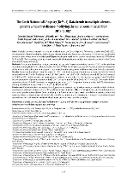The Czech National MS Registry (ReMuS): Data trends in multiple sclerosis patients whose first disease-modifying therapies were initiated from 2013 to 2021

Author
Lauer, Michal
Mazouchová, Aneta
Adámková, Jana
Ampapa, Radek
Dufek, Michal
Grunermelova, Marketa
Hradilek, Pavel
Martínková, Alena
Recmanová, Eva
Štourač, Pavel
Publication date
2024Published in
Biomedical PapersPublisher / Publication place
Palacký UniversityVolume / Issue
168 (3)ISBN / ISSN
ISSN: 1213-8118ISBN / ISSN
eISSN: 1804-7521Funding Information
FN//I-FNM
FN//RVO-VFN64165
UK//COOP
FN//I-FNP-06
MZ0//NU22-04-00193
FN//I-FNHK
MSM//LX22NPO5107
Metadata
Show full item recordThis publication has a published version with DOI 10.5507/bp.2023.015
Abstract
AIMS: Multiple sclerosis treatment strategies are changing in the Czech Republic. According to data from 2013-2021, the proportion of patients starting high-efficacy disease-modifying therapies is increasing. In this survey, we describe the actual data trends in multiple sclerosis (MS) patients beginning their first disease-modifying therapies (DMTs) from 2013 to 2021. The secondary objective was to present the history, data collection, and scientific potential of the Czech National MS registry (ReMuS). METHODS: First, using descriptive statistics, we analysed the data for patients starting their first DMTs, either platform (including dimethyl fumarate) or high-efficacy DMTs (HE-DMTs), for each successive year. Second, a detailed description of the history, data collection, completeness, quality optimising procedures, and legal policies of ReMuS is provided. RESULTS: Based on the dataset from December 31, 2021, the total number of monitored patients with MS in ReMuS increased from 9,019 in 2013 (referred from 7 of 15 MS centres) to 12,940 in 2016 (referred from all 15 Czech MS centres) to 17,478 in 2021. In these years, the percentage of patients treated with DMTs in the registry ranged from 76 to 83%, but the proportion of patients treated with HE-DMTs changed from 16.2% in 2013 to 37.1% in 2021. During the follow-up period, a total of 8,491 treatment-naive patients received DMTs. The proportion of patients (all MS phenotypes) starting HE-DMTs increased from 2.1% in 2013 to 18.5% in 2021. CONCLUSION: Patient registries, including ReMuS, provide an essential quality data source, especially in light of the increasing percentage of patients on HE-DMTs. Although early initiation of HE-DMT can provide considerable benefits, it also carries greater potential risks. Consistent long-term follow-up of patients in real-world clinical practice, which only registries allow, is therefore crucial to evaluate the efficacy and safety of therapeutic strategies, for epidemiological research and to assist decision making by healthcare providers and regulatory bodies.
Keywords
disease-modifying therapy, epidemiology, high-efficacy therapy, multiple sclerosis, platform therapy, real-world data, registry, treatment initiation
Permanent link
https://hdl.handle.net/20.500.14178/2634License
Full text of this result is licensed under: Creative Commons Uveďte původ 4.0 International







